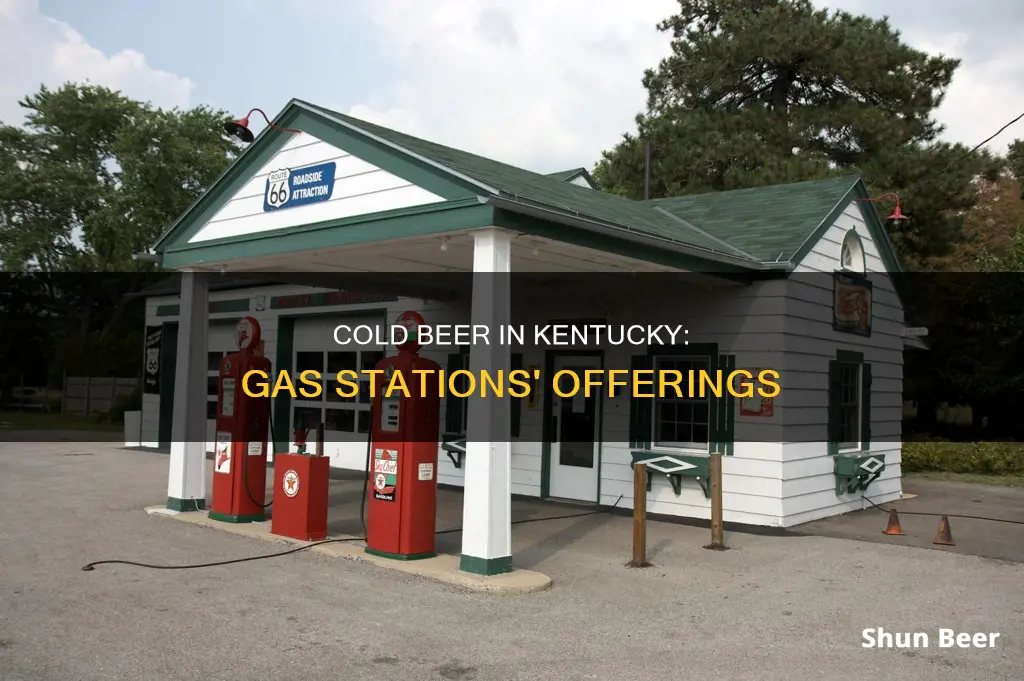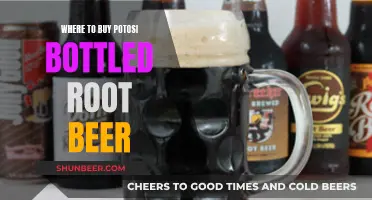
The ability to buy beer at gas stations in Kentucky is a convenience that many residents appreciate. However, it is important to note that gas stations are not required to sell beer, and many do not. In Kentucky, there are two types of counties: dry, meaning the sale of alcohol is prohibited, and wet, meaning the sale of full retail alcohol is permitted. The state also has several technically areas, including wet cities and 'moist' counties, where restaurants are the only places where alcohol can be sold.
| Characteristics | Values |
|---|---|
| Can you buy beer at gas stations in Kentucky? | Yes |
| Is it common to buy alcohol at gas stations in the US? | Common in most places |
| Is it legal to sell beer in sealed containers at gas stations? | Yes |
| Are there restrictions on the hours during which beer can be sold at gas stations? | Yes |
| Is it legal to sell beer to minors or intoxicated persons at gas stations? | No |
| Is there a definitive time when gas stations in Kentucky stop selling beer? | No, but most stop around 10 PM |
| Is it legal to sell beer on Sundays in Kentucky? | Yes, but not before 1 PM |
| Are there dry counties in Kentucky? | Yes |
What You'll Learn

Kentucky's alcohol laws
Dry, Wet, and Moist Counties:
Kentucky has a mix of dry, wet, and moist counties. Dry counties prohibit the sale of alcoholic beverages, while wet counties permit full retail sales of alcohol under state license. Moist counties have a mix of dry and wet cities, with some areas allowing alcohol sales while others do not. Of Kentucky's 120 counties, 39 are dry, 32 are wet, and 49 are considered moist or dry with special circumstances.
Local Option Elections:
The laws regarding alcohol sales in Kentucky can change frequently due to local option elections, which allow counties, cities, or precincts to vote to become wet or dry. If a dry city votes to become wet, individual precincts within the city can still hold elections to remain dry. However, if a wet city votes to become dry, precincts within that city cannot hold another election to return to wet status.
Retail Sales:
The sale of alcohol in retail stores, including grocery stores and gas stations, is regulated in Kentucky. Beer can be sold in grocery stores and gas stations, but wine and spirits are restricted to state-licensed retail establishments. Grocery stores can obtain a license to sell wine and liquor if they provide a separate entrance for these products and ensure that minors do not work in that area.
Licensing:
Kentucky has a complex system of licensing for alcohol sales, with over 70 types of licenses available, including four types of restaurant licenses. The state has issued more than 13,000 licenses, and businesses must obtain the appropriate license to sell alcohol.
Purchase and Consumption Laws:
The minimum age to purchase and consume alcohol in Kentucky is 21. It is illegal to consume alcohol in public places such as parks and streets, and public intoxication is prohibited. Kentucky also has laws restricting open containers in vehicles and prohibiting drinking and driving.
Sale Hours and Days:
The hours and days during which alcohol can be sold vary across Kentucky. For example, in Louisville, a permit for the sale of alcoholic packaged beverages is valid from 1:00 p.m. to 4:00 p.m. on Sundays, while in Lexington, the sale of packaged beer and wine is allowed from 11:00 a.m. to 2:30 a.m. on Sundays. Gas stations typically stop selling beer in the evening, around 8:00 p.m. or 10:00 p.m.
Overall, Kentucky's alcohol laws are complex and vary significantly across the state, with different regulations for dry, wet, and moist counties. The laws governing the sale and consumption of alcohol aim to balance the interests of residents, businesses, and public safety.
Buying Beer on Fourth of July: What's the Deal?
You may want to see also

Dry, wet, and 'moist' counties
The sale of alcohol in Kentucky is governed by a complex set of laws that vary from county to county. These laws categorise counties as either "dry", "wet", or "moist".
A "dry county" prohibits the sale of alcoholic beverages. In these counties, you cannot buy cold beer from gas stations or any other retailer.
A "wet county" permits the full retail sale of alcohol under a state license. In these counties, you may be able to buy cold beer from gas stations, depending on individual state and county laws.
A "moist county" is a county that falls somewhere between "dry" and "wet". The term is typically used for any county that allows alcohol to be sold in certain situations but has limitations on sales that a normal "wet" county would not have. For example, a "moist county" may only allow the sale of alcohol in restaurants, and even then, only if the restaurant derives at least 70% of its income from food sales.
The status of alcohol sales in Kentucky frequently changes due to local option elections, which allow counties, cities, or even individual precincts to vote to become "wet" or "dry".
As of 2015, of Kentucky's 120 counties, 39 were dry, 32 were wet, and 49 were moist or dry with special circumstances. However, these numbers may have changed due to local option elections since then.
Buying Beer on Sundays in Powder Springs, GA: What's Allowed?
You may want to see also

Buying alcohol in other US states
Alcohol laws in the United States vary significantly from state to state. The 21st Amendment to the US Constitution grants each state and territory the power to regulate alcohol within their jurisdiction. Here's a breakdown of some of the key differences in buying alcohol across different US states:
- Minimum Age: In most states, you must be at least 21 years old to purchase and consume alcohol. However, some states like Ohio allow those under 21 to drink in public places like bars and restaurants if accompanied by a parent or guardian who is 21 or older.
- Dry Counties/Cities: Some states have dry counties or cities, where the sale of alcohol is prohibited. For example, Kentucky has a mix of dry, wet, and "moist" counties with varying restrictions on alcohol sales.
- Retail Locations: The types of stores where alcohol can be purchased differ by state. For instance, in some states, alcohol is sold only in licensed liquor stores, while in others, it's available in supermarkets, convenience stores, and gas stations.
- Shipping and Delivery: Laws regarding shipping and delivery of alcohol are changing rapidly. Most states allow out-of-state manufacturers to ship wine directly to consumers, but restrictions on shipping beer or liquor are more common. A few states, like Florida, Kentucky, and the District of Columbia, allow the direct shipment of all types of alcohol.
- Blue Laws: Many states have Blue Laws that restrict alcohol sales on Sundays or during specific holidays. These laws can vary within a state, with different rules for dry and wet counties.
- Licensing: Each state has its own licensing system for alcohol sales, with some states having more complex requirements than others.
- Drinking in Public: While drinking in public is generally prohibited, there are exceptions in certain areas like New Orleans, where alcohol can be consumed on the street if it's in an unbreakable container.
- Open Container Laws: These laws vary by state and often apply only to drivers, not passengers. For example, in Tennessee, it's legal to carry an open container of alcohol on the Beale Street stretch in Memphis.
Blue Moon Beer: Is It Available in Canada?
You may want to see also

Alcohol laws in Louisville
The alcohol laws in Kentucky vary from county to county and can be classified as "wet", "dry", "moist", or dry with special provisions. This has created a confusing patchwork of regulations that can be challenging to navigate for businesses and consumers alike.
- On Sundays, the sale of packaged alcohol is permitted from 1 pm to 9 pm.
- Alcohol sales are prohibited during the 24 hours of Sunday unless a local ordinance permits it.
- The legal age to purchase alcohol in Louisville is 21, as in all U.S. states. However, the legal age to sell or serve alcoholic beverages in a licensed establishment is 20.
- Grocery stores can sell beer in the main shopping area. They can also sell wine and spirits if they provide a separate entrance and do not allow minors to work or be present in that area.
- It is illegal to sell or serve alcohol during the hours that election polls are open for any primary, general, or local option election.
- Businesses that sell alcohol must post their licenses in a conspicuous place and display the Alcoholic Beverage Control (ABC) signs warning minors about the dangers of alcohol.
- Alcohol license holders cannot transfer their license without approval from the ABC and must keep alcohol-related business records for two years.
- Retailers must purchase all alcoholic beverages from a wholesaler or distributor licensed to sell in Kentucky.
- Gambling is permitted on licensed alcoholic premises under certain conditions, such as when authorized by the Kentucky Lottery Corporation or during charitable gaming events.
- It is illegal to sell or give alcohol to intoxicated individuals or to allow anyone to become intoxicated on the licensed premises.
- Establishments that hold a retail liquor drink license must obtain a supplemental liquor license for each additional public bar in operation.
- Employees must be at least 20 years old if alcoholic beverages are sold in a liquor package store or by the drink. If beer is sold for consumption off the licensed premises, 18 or 19-year-olds may be employed under direct supervision.
- It is illegal to employ individuals with felony convictions or those with two or more alcohol-related convictions within a two-year period.
Old Age and Beer: Legal Drinking Limits
You may want to see also

Drinking in dry counties
The complexity arises from the local option elections, which allow communities to decide whether to permit alcohol sales. This has resulted in a mix of wet counties, which allow full retail sales under a state license, and "moist" counties, which occupy a middle ground. For instance, a moist county may be dry but allow alcohol sales in specific cities, country clubs, wineries, or other locations within the county.
The laws governing alcohol sales in Kentucky have been described as a maze of obscure statutory language by a Kentucky Supreme Court justice and are subject to frequent changes due to local elections. This dynamic nature of alcohol regulations can make it challenging for residents and visitors to keep up with the rules in different parts of the state.
Adding to the complexity, Kentucky has over 70 types of licenses for alcohol sales, including different classifications for restaurants, golf courses, wineries, and historic sites. The legal age to purchase alcohol in Kentucky is 21, which is consistent across the United States. However, the minimum age to serve or bartend in establishments selling alcohol is 20.
It is worth noting that the dry county laws in Kentucky do not restrict drinking but only prohibit sales. This means that while individuals may possess and consume alcohol in dry counties, they need to acquire it from elsewhere. As a result, those living in dry counties may have to drive longer distances to obtain alcohol, potentially leading to an increase in impaired driving exposure and alcohol-related traffic accidents.
McDonald's Beer: Is It Possible to Buy?
You may want to see also
Frequently asked questions
No, gas stations in Kentucky are not allowed to sell beer on Sundays. However, beer can be purchased at gas stations in Kentucky on other days of the week.
Beer can be sold from 6:00 a.m. to midnight Monday through Saturday, and from 11:59 p.m. on Sundays.
Yes, beer sold in gas stations in Kentucky must contain no more than three ingredients.







